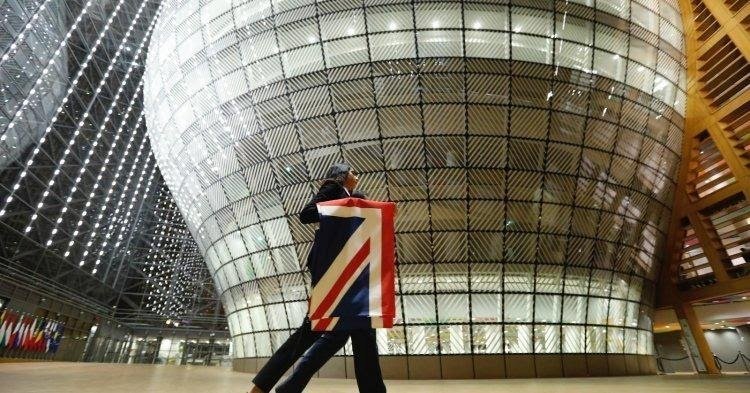The New Federalist: One might have thought that the departure of the British would have facilitated discussions within the European Council. Instead, it revealed more pre-existing stances such as those of the “frugal states” during the last budgetary negotiations. In the end, was the United Kingdom just unable to see the forest for the trees?
Étienne Criqui: It is partly true that at the beginning of the process after the 2016 referendum, some had said that the departure of the United Kingdom was detrimental to the European Union in many respects, economic in particular. However, some said that, politically speaking, European integration would become easier as the UK had often been a hindrance to political integration, even if they had generally played the game of economic integration, which was a little less monetary. Yet we can see that even on this level, it is difficult to move forward: negotiations on the $750 billion COVID-19 package with a portion of loans and subsidies was difficult to prepare due to opposition from a number of “frugal states”, notably the Netherlands and Austria. Perhaps the United Kingdom would have followed the same logic, but even without it, it was complicated.
TNF: Does this strengthen the influence of Central Europe in these discussions?
EC: For countries like Poland or Hungary, the UK’s departure is a bad thing as it could have supported them on the “less integration” problem. Indeed, we can clearly see the idea behind it: to obviously benefit from the Common Agricultural Policy and subsidies, but to go no further into a politically integrated Europe. In this respect, Poland and Hungary were on the same wavelength as the United Kingdom, but do not bear the same amount of influence. Nevertheless, this does not solve all the existing problems.
TNF: Finally, will the UK’s exit allow us to progress further on certain issues? On the contrary, will it be detrimental to recent progress?
EC: We cannot say for sure whether it will be easier to make progress on some issues with the UK’s departure. This is because when they have made their differences known, which has happened on several occasions, they have seldom been alone. They are not the only country able to opt out; Denmark has also been able to, Sweden has not adopted the Euro and so on. There have rarely been impossibilities linked exclusively to the United Kingdom. From this perspective, this should not change the situation.
TNF: Is Brexit ultimately a vaccine against the Article 50 virus, or conversely a kind of haemorrhage after such a departure?
EC: Both scenarios are conceivable. The UK is out of the EU, and within a few days we will see under what conditions exactly, which proves that this article can indeed allow the exit of a Member State. So, it is therefore a process that is now conceivable, even though it was not originally designed to allow a state to leave the European Union for their own convenience. In the minds of the drafters of the treaty (editor’s note: The Treaty of Lisbon came into force in 2009), it was intended to enable a State that would no longer have its place because, for example, the democratic regime would have been replaced by a real dictatorship, to “leave”. It was not envisaged that a State would ask for its own exit, even though the United Kingdom had already contemplated it with a referendum 40 years earlier (editor’s note: in 1975), when Harold Wilson renegotiated the agreement signed by his predecessor and had anticipated that the country would leave the Community if the “no” vote prevailed. It can also serve as a deterrent, as we can realise it’s very complex and can be detrimental to the state that decides to leave, as seen with the United Kingdom, despite the fact that it is a large state in Europe. It can therefore serve as a warning; it is hard to imagine Hungary or Poland invoking Article 50 as they would have even more to lose than the United Kingdom, all the more so as they are beneficiaries - it is vital for them. It therefore seems inconceivable, in the current state of the EU, that these countries would leave.
TNF: With the UKs exit, is there a risk of “loss of influence” for the European Union in world diplomatic exchanges?
EC: This could be a risk, despite the fact that the UK had always held back on this subject at the diplomatic level. The Foreign Action Service, by contrast, bears this name and not that of a Foreign Office because the British had put their veto on it. From this point of view, their absence should not fundamentally change the situation. It is rather the Union’s willingness to take real diplomatic action that is at stake, and this does not depend on the United Kingdom. Where this could be more detrimental is in the area of defence: The United Kingdom, alongside France, is a major player in Europe and far ahead of the others. In view of what is on the present agenda, i.e., moving towards a European defence, while remaining within NATO, obviously the absence of the UK is harmful, even if the UK could be associated with this issue in a different framework of the European Union.
TNF: Brexit could have been the moment of what some people call an ‘institutional and political breakthrough’ with the establishment of a transnational list during the last European elections. Is this a failure?
EC: It is indeed an old chestnut, since the first report on transnational lists dates from 2011. This was very recently reiterated in a resolution calling for transnational lists to be introduced for the 2024 elections (editor’s note: the resolution was rejected following the vote of a deletion amendment). The answer is largely up to the Member States; it does seem that there is currently no unanimity for the adoption of such an amendment. Many opposing views have been expressed, not just those that the British could previously have had - perhaps France could be a supporter of this principle, but it is not unanimous. In 2018, the majority of the EPP opposed such a development, but beyond the Parliament, it would require the agreement of the Member States, all the more so as the Parliament still defends the principle of the Spitzenkandidaten, but here too, there are oppositions.


Follow the comments: |
|
